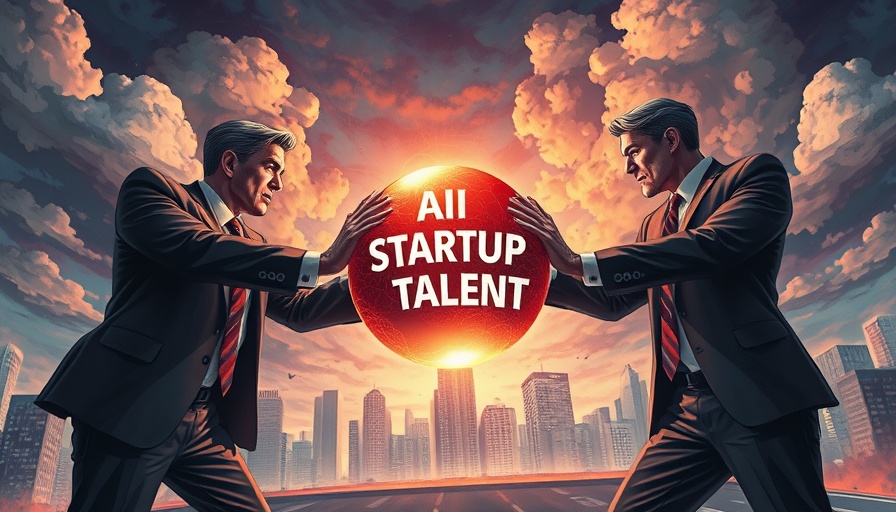
Understanding the Windsurf Acquisition: A Case Study
The recent acquisition of Windsurf by Google through a so-called "aqua hire" raises significant questions about the future landscape of startups, particularly in the competitive AI sector. While these deals may seem benign or standard practice in Silicon Valley, they can have far-reaching consequences on employee morale and trust. With Google reportedly hiring key Windsurf executives for $2.4 billion while leaving many employees behind with minimal compensation, the situation exemplifies the ethical implications of tech acquisitions today.
In 'Are AI Acquihires Screwing Up the Startup Space?', the discussion dives into the implications of the Google-Windsurf acquisition, prompting a deeper analysis of its effects on employee morale and the startup ecosystem.
The Blurred Lines of Aqua Hiring and Its Impact
In the tech industry, aqua hires are increasingly being utilized as a method to acquire valuable talent without the complications of a full acquisition. The Windsurf case, where Google absorbs top talent while leaving behind a shell company, represents a new trend that could undermine employee investment in startup success. Employees often sacrifice stability for the promise of equity, which is now seemingly devalued in these types of transactions. This raises the question: what does it mean to work for a startup if the reward structure is continuously under threat?
The Bigger Picture: Trends in AI Acquisitions
Windsurf's predicament is indicative of a broader trend in AI acquisitions, termed "Blitz Hire Acquisitions." Instead of adhering to conventional practices, tech giants are opting for quicker routes to securing talent. As noted by Billy Itchf, the pace of AI development necessitates speed over traditional regulatory compliance, leading to these less-than-ethical deal structures. Consequently, startups may find themselves competing not just for market share, but for their very existence as they contend with the aggressive tactics of larger players.
Employee Morale: A Casualty in Competitive Landscapes
The fallout from the Windsurf acquisition could be felt not just internally, but across the startup ecosystem. Many employees reported feeling betrayed, as their hard work seemingly yielded little in the way of benefits following the acquisition. Entrepreneur Dave Pack's commentary epitomizes a growing sentiment: as these aqua hires proliferate, the dream of equity becomes less tangible for early-stage employees. When success stories turn sour due to corporate maneuvering, it can lead to disillusionment and reluctance to take on risks in the future.
Regulatory Concerns: The Antitrust Paradox
A desire to circumvent regulatory scrutiny plays a significant role in these acquisition strategies. Critics suggest that Lena Khan's aggressive pursuit of antitrust action has unintentionally encouraged tech giants to devise creative ways to sidestep typical acquisition procedures. With the acceleration of AI, it seems that rapid talent acquisition is prioritizing speed over ethics, leaving a generation of startup workers potentially disenfranchised.
Future Implications: Rethinking Startup Culture
The controversy surrounding the Windsurf acquisition opens the door for larger discussions about the future of startup culture. If young companies are continually forced into positions that minimize employee rewards, a culture of mistrust will emerge, leading to a workforce that is less motivated to invest their time and effort into innovative pursuits. Founders and venture capitalists need to reconsider their approaches to equity distribution if they wish to foster a robust and committed workforce.
The takeaway from the Windsurf situation is clear: as the AI landscape evolves, so must the practices surrounding talent acquisition and employee treatment. If discussions at industry events and conferences center around how to handle these challenges ethically, there exists hope for a future where innovation coexists harmoniously with fair employee practices. Startups and their leaders must remain vigilant, ensuring that economic narratives do not overshadow the human element that drives their achievements.
For business owners navigating this rapidly changing technological landscape, the message is clear: START USING AI NOW. The stakes are high, and understanding these dynamics is essential for making informed decisions that positively impact your business.
 Add Row
Add Row  Add
Add 




Write A Comment